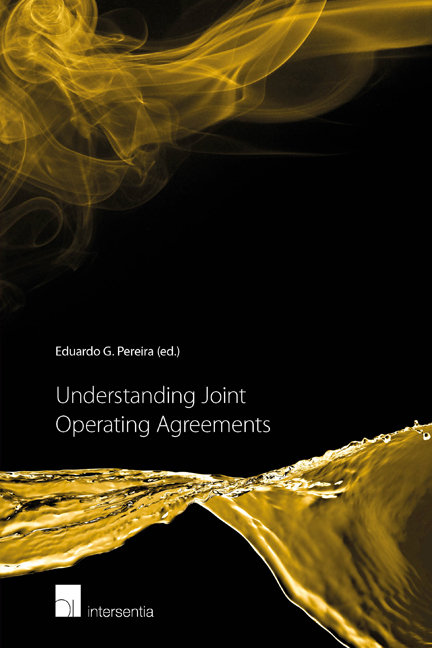Book contents
- Frontmatter
- Contents
- List of Abbreviations
- List of Authors
- Introduction
- PART I CONSIDERATIONS PRIOR TO ENTERING INTO A JOA
- 1 Bribery Laws and Compliance
- 2 The Relationship with Other Joint Venture Agreements
- 3 Unitisation and Unit Operating Agreements
- 4 Key Issues Relating to JOAs in Civil Law Countries
- 5 The Relationship between a JOA and a Host Government Instrument
- 6 Decommissioning Obligations, Practices and Procedures
- 7 Standards and Practices in JOAs across the Petroleum Industry
- 8 Modifying the Standard JOA to Accommodate Unconventional Petroleum Projects
- PART II SETTING UP A JOA
4 - Key Issues Relating to JOAs in Civil Law Countries
from PART I - CONSIDERATIONS PRIOR TO ENTERING INTO A JOA
Published online by Cambridge University Press: 15 December 2017
- Frontmatter
- Contents
- List of Abbreviations
- List of Authors
- Introduction
- PART I CONSIDERATIONS PRIOR TO ENTERING INTO A JOA
- 1 Bribery Laws and Compliance
- 2 The Relationship with Other Joint Venture Agreements
- 3 Unitisation and Unit Operating Agreements
- 4 Key Issues Relating to JOAs in Civil Law Countries
- 5 The Relationship between a JOA and a Host Government Instrument
- 6 Decommissioning Obligations, Practices and Procedures
- 7 Standards and Practices in JOAs across the Petroleum Industry
- 8 Modifying the Standard JOA to Accommodate Unconventional Petroleum Projects
- PART II SETTING UP A JOA
Summary
INTRODUCTION
Whilst each of these states in which the oil and gas industry operates has its own particular needs and requirements, they tend to share notable similarities deriving from the international nature of the oil and gas industry. Most of the major companies have assets in various jurisdictions, and so influence national governance by applying international practices and sharing expertise under local content requirements. More oft en than not, national regulation takes into account regulatory models and experiences of other jurisdictions so they can improve their own regulatory regime.
The same situation applies for JOAs, a well-established form of private agreement. Despite the fact that many of the oil and gas regions have their own JOA model form to address their specific needs, almost all of such models are based on similar principles and assumptions.
Nevertheless, negotiating, executing and implementing a JOA in a civil law country may generate unexpected legal challenges unless such parties are aware of the differences between the common law and civil law systems. The main difference relates to the primary source of law. In civil law systems, the primary source of law derives from statutes and regulations, whereas in common law jurisdictions the primary source of law is case law (judicial precedents). Therefore, judges in civil law jurisdictions are not empowered to make law but rather to interpret statutory law and to an extent take on the role of an investigator. Some civil law jurisdictions however are moving towards certain rules of legal precedents within their relevant courts (e.g. Brazil). Whilst civil law judges are strictly bound by the country ‘ s constitution, the legal praxis and expert opinions of the scholars are gradually being given greater consideration.
Naturally, all countries have their own special features. In China, for example, judges are bound to the interests of the Chinese Communist Party. In federal countries such as in Russia and Argentina, the legislative power at the provincial level must be acknowledged. Moreover, when parties elect to agree that the JOA is governed by a common law jurisdiction (e.g. English law) in a civil law country, the provisions of the JOA are subject to and therefore need to be harmonised with the host government agreement and any mandatory provisions applicable under local petroleum laws.
- Type
- Chapter
- Information
- Understanding Joint Operating Agreements , pp. 61 - 80Publisher: IntersentiaPrint publication year: 2016



